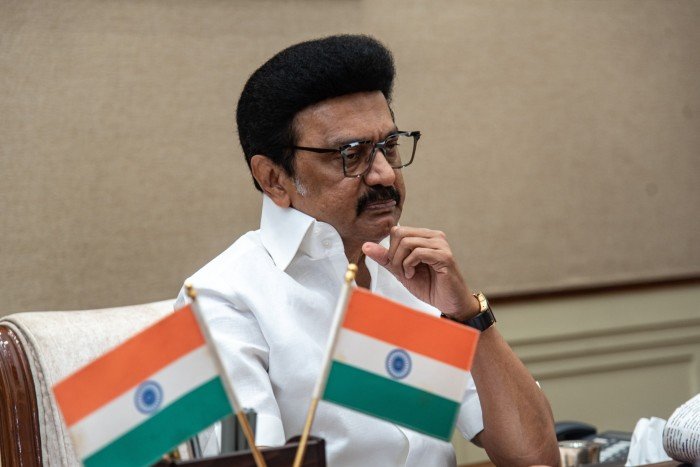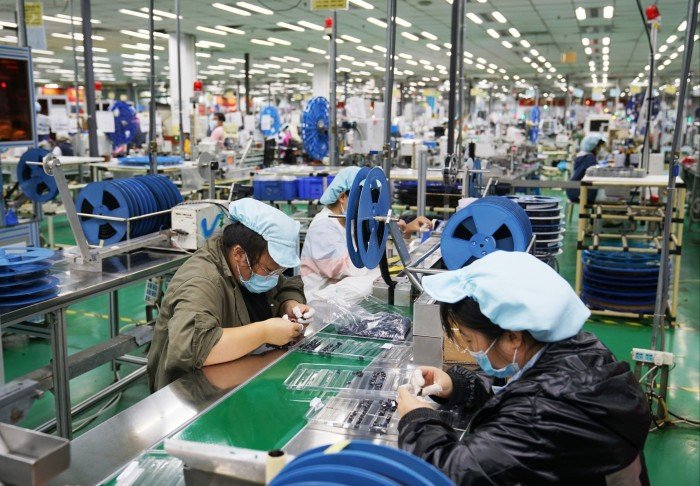Apple has increased the number of flights carrying consignments of iPhones from India to the US following Donald Trump’s tariff blitz, as the tech giant grapples with one of the biggest threats to its business in years.
In the days since Trump’s “liberation day” announcement, at least 10 flights have taken off from Chennai International Airport, according to three Indian officials with knowledge of the matter.
Apple is relying on deepening its relationship with India to help it counter the immediate impact of the US President’s aggressive China tariffs, after it failed to get a last-minute exemption from Washington’s 104 per cent levy on the country that came into effect on Wednesday.
Two Indian officials told the Financial Times that the US tech giant was looking at further investment into the country. “Apple is definitely thinking of doing more in India,” said one official. Apple declined to comment.
Apple has been one of Wall Street’s biggest casualties of the US president’s tariff blitz — losing about $700bn in market value since last week’s announcements — highlighting the dilemma the group faces, having built its business around advanced manufacturing in China.

Reserving India’s entire iPhone output for the US would allow it to cover some 30mn of the 50mn-plus iPhones it ships to the US each year, according to Bank of America analyst Wamsi Mohan.
“I do think they have done some of that work to mitigate some of the impact in the very near term, but it’s obviously not a sustainable kind of solution for any extended period of time,” Mohan said.
Apple has been quietly growing its business in India, particularly since the coronavirus pandemic wreaked havoc on its China supply chains, but it still has about 80 per cent of its smartphone manufacturing in China, according to Counterpoint Research.
On Wednesday, MK Stalin, the chief minister of Tamil Nadu, India’s southernmost state which is home to four of the country’s five iPhone plants, met with Andy Priestley, an executive from key Apple supplier Jabil, which last year announced an memorandum of understanding with the state to expand its facility there.
US-based Jabil has not publicly spoken about supplying Apple in India. On X, Stalin said the meeting concerned “making new business investments in Tamil Nadu”.
While India has been targeted by Trump with steep “reciprocal” tariffs of 27 per cent, the country has sought to placate him by opening talks on a bilateral trade agreement with the US that Indians hope could see the tariff burden reduced.
Moreover, India is expected to be one of the beneficiaries of Trump’s announcement on Wednesday that he was pausing additional tariffs on a wide range of countries that were willing to negotiate with the US. These nations will still be the subject of 10 per cent levies on their exports to America.
Apple’s shares rose sharply after Trump’s statement on his Truth Social platform. The US president later held out the prospect of some individual companies being exempted from the impact of reciprocal tariffs, saying: “We’re going to take a look at it.”
Despite Apple leaning more heavily on India for now, it does not have the supply chain in the country to boost manufacturing significantly — leaving it exposed to substantial tariffs over the longer term and having to consider either raising prices for its high-end electronics or finding ways to swallow the extra costs.

Multiple analysts said they expected any price hikes from Apple to come later in the year, potentially with the new iPhone launch expected in September, and that they were likely to be introduced globally, spreading the impact of the US tariffs across consumers worldwide.
Apple could also apply pricing pressure on its suppliers to pass on part of the impact from tariffs, they said.
A more intractable concern for Apple is how to navigate Trump’s push for “made in America” iPhones. The administration has doubled down on the idea that Apple can begin manufacturing iPhones in the US, something experts say would not only be astronomically expensive for the company but also impractical, given how deep its China ties run.
“Trump believes we have the labour, we have the workforce, we have the resources to do it,” White House press secretary Karoline Leavitt said on Tuesday, echoing sentiments voiced by commerce secretary Howard Lutnick over the weekend.
It would probably cost Apple “several billions” of dollars to shift even a portion of its iPhone supply chain to the US, according to estimates by Morgan Stanley analysts. Wedbush analyst Dan Ives estimated it would take Apple three years and $30bn to move just 10 per cent of its supply chain from Asia to the US.
“This is a company that has embedded itself in China and south-east Asia for decades, now seemingly looking at the prospect of being forced to change the entire way in which they think about building and pricing an iPhone,” says Erik Woodring, analyst at Morgan Stanley.
The pressure comes despite Apple pledging in February to hire 20,000 staff as part of a $500bn US spending plan for the next four years that includes a new facility manufacturing servers for artificial intelligence in Texas.
The fact that Apple does not currently run its own manufacturing facilities, but outsources them to Asia-based companies it has spent two decades and billions of dollars nurturing with specialist equipment, adds an additional layer of complexity.

iPhone assembly is currently done in mainland China by companies such as Taiwan’s Foxconn and Pegatron and to a lesser extent in India, where Tata is building capacity as an Apple supplier. It is the final step in a vast chain of Apple suppliers, most of which are currently based in Asia.
There are 387 individual parts involved in final assembly of an iPhone 16, according to market research group TechInsights, which include chips, circuit boards, batteries, wires, lenses, screens and metal and plastic parts.
Apple’s most recent public supplier list, which covers the 2023 fiscal year, shows the 187 companies responsible for 98 per cent of the company’s direct spend that year. Of these companies, 169 had a manufacturing presence in mainland China and Taiwan.
Beyond China, the company faces pressure all across its supply chain. Vietnam, a key MacBook exporter, has been hit with 46 per cent tariffs despite an offer from the country’s government to slash levies on US goods to zero.
While assembling iPhones in the US is “technically” possible to do in the US, said Bank of America’s Mohan, the question is “whether the components that are being sourced to make an iPhone are going to get tariffed,” he added. “If so, then it’s a massive headache.”
Following a call with executives at Luxshare, another key Apple supplier, Bernstein analysts said it confirmed their view that moving iPhone assembly to the US was “impractical” as it would “remain reliant on Asian components subject to tariffs.”


